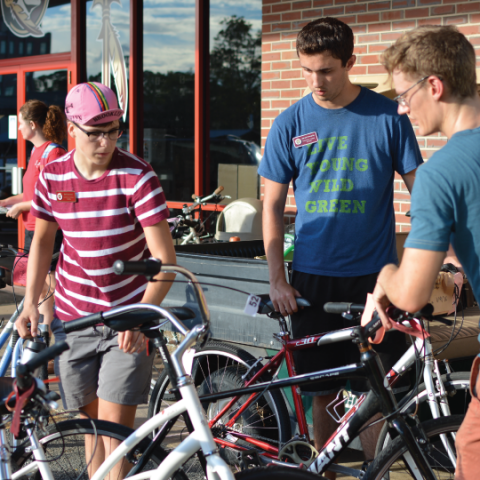FSU ReCycle Bike Program Holds Bike Safety Class

In preparation for the upcoming school year, the Florida State University reCycle Bike Program recently teamed with the Florida State Police Department to create and present a set of guidelines promoting bike safety and biker awareness on and off campus.
Representatives from the reCycle Bike Program—sponsored by Florida State University Sustainable Campus—stood at Integration Statue on Thursday morning, Aug 25, to provide fundamental knowledge about cycling, ranging from state laws and mandatory guidelines to helpful advice and regional tips.
Beth Burford, a senior and student program coordinator with the FSU reCycle Bike Program, lead the class through different scenarios involving bike safety, handing out complimentary ‘swag bags’ full of pamphlets and useful equipment to everyone in the audience.
“Make yourself seen—wear bright colors, use a headlight and a blinking taillight at night,” remarked Burford, as she pulled several reflective strips from her swag bag as an example.
More tips and guidelines on bike safety from Burford and the reCycle Bike Program included:
- Keep headphones out of your ears
- Avoid hugging the curb or gutter
- Take up the whole lane when appropriate (i.e. when crossing intersections)
- Communicate with other drivers; use hand signals; be polite
- Yield to pedestrians, stop at traffic lights and stop signs
While outlining the possible dangers of riding a bike and how to avoid them, Burford also explained the safety benefits of cycling.
“You are exposed to everything—statistically, the more bikes and bikers in a certain location, the safer the roads,” said Burford.
As a student coordinator for the reCycle Bike Program, Burford is part of the initiative to provide a low-cost, sustainable transportation option for FSU student and to see more bikes on and off campus.
The FSU reCycle Bike Program promotes a healthy, environmentally friendly lifestyle by offering students a low-cost, rental bike program for one semester ($60) or the whole school year ($100).
“People who bike are helping the environment, helping themselves and helping the community,” added Burford.
In addition to a bike, renters will receive different information and opportunities to learn about bicycle repair and maintenance, commuting on and off campus, and connecting with the cycling community in Tallahassee.
The FSU reCycle Bike Program rents out the recycled bikes on a first come, first serve basis during the first week of the semester.
As well as providing the equipment, the reCycle Bike Program has many resources for bicyclists and non-bicyclists on its Facebook page, including digital biking routes. The program is also in the process of recording bike routes on camera to create a video library of bike paths around the city.
At the end of the safety class, a Sustainable Campus representative attached a goPro camera to her helmet, as the reCycle Bike Program the FSUPD offered a group bike ride from Integration Statue to Railroad Square and back.
“It can definitely be looked at as community building,” said Burford. “We are trying to connect our campus, make it safer, and make cycling and bike safety a collective initiative at FSU.”
